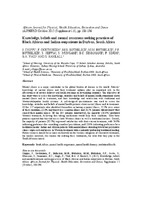Knowledge, beliefs and mental treatment seeking practices of Black African and Indian outpatients in Durban, South Africa
Date
2015Author
Oosthuizen, F.
Buthelezi, M.B.
Buthelezi, M.M.
Buthelezi, P.F.
Jeewa, S.
Munsami, S.
Simamane, B.C.
Singh, P.
Vaid, B.A.
Ramlall, Suvira
Chipps, Jennifer
Metadata
Show full item recordAbstract
Mental illness is a major contributor to the global burden of disease in the world. Patients’ knowledge of mental illness and their treatment options play an important role in the effectiveness of service delivery and health outcomes in developing countries. The objectives of this study were to assess the knowledge, attitudes and beliefs of mental health outpatients about mental illness and its treatment, and their knowledge and satisfaction with traditional and Western/allopathic health systems. A self-designed questionnaire was used to assess the knowledge, attitudes and beliefs of mental health patients about mental illness and its treatment. Of the 157 outpatients who identified themselves as having a mental illness, 77.7% were aware of their condition, 33.8% only knew it as a mental illness and 21.5% patients did not know what caused their mental illness. Of the 195 patients interviewed, the majority (76.9%) preferred Western treatment, believing that taking medication would help their condition. Sixty-three patients reported that they did access both Western clinics as well as traditional healers. Overall, the majority of patients (82.5%) expressed satisfaction with their current treatment, with 76.9% indicating preference for consulting a medical practitioner, and 13.8% indicating preference for a traditional healer. Indian and African patients with mental illness attending two urban psychiatric clinics expressed confidence in Western treatment with a minority preferring traditional healing. Future research should focus more exclusively on the various categories of alternative treatment, the healers involved, the reasons for seeking these treatments, the roles that they play in the South African context.

